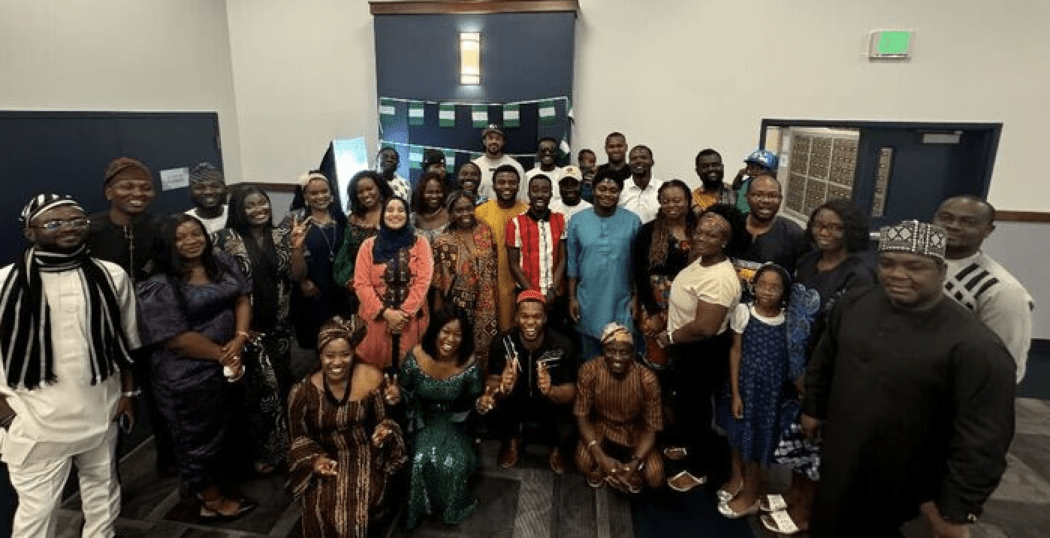Nigerian Student Association celebrates Nigerian Independence Day
Nigeria won its long-sought-after freedom from British colonial rule on Oct. 1, 1960, ushering in a new era of progress and unity for the West African country. Decades later, Nigerians around the world continue the memory of this day with parades, parties and celebrations of Nigerian culture.
The Nigerian Student Association at Utah State University brought the celebration of Nigeria’s 64th Independence Day to Logan with a night of traditional food, dancing and trivia.
“It’s an exhibition about what Nigeria stands for,” said Olanrewaju Adeyemi, graduate student and vice president of the association. “It’s giving people an insight into what Nigeria is and what we do without having to fly to Nigeria.”
Nigeria is one of the most diverse countries in the world with over 500 native languages and 250 ethnic groups — the largest being the Yoruba, Hausa and Igbo. The Nigerian Student Association aims to capture and spread Nigeria’s rich culture at USU.
The event featured popular Nigerian cuisine such as Jollof rice and puff puff — sweet, golden-brown dough balls. Gizdodo, a Yoruban classic, is a dish made from gizzard and plantain cooked in a peppery sauce.
“My favorite is Jollof rice,” Adayemi said. “There is no Nigerian party without the Jollof rice. Any party you attend, there is definitely going to be Jollof rice.”
Attendees learned more about Nigerian culture as they ate through trivia about the country and presentations from speakers. One speaker introduced attendees to the Gele, a head tie worn by African women in Nigeria, Togo and Benin. Attendees were then invited to participate in a competition of who could wrap the fastest Gele.
The event served as a way for Nigerian students to get a taste of home and engage in Nigerian culture from 7,000 miles away.
“There are some of us who haven’t been to Nigeria for five years since we started grad school,” Adeyemi said. “The event gives us a sense of belonging even when we are not with our family or with our people and that we’re still a part of Nigeria.”
Chinedum Anajemba, graduate student, is the president of the Nigerian Student Association.
“I was not expecting the number we had,” Anajemba said. “This was the inaugural event, and we had a great turn out. We put a lot of effort and time into this event, and I’m grateful all of our hard work was a success.”
Adeyemi, Anajemba and other members of The Nigerian Student Association founded the association this fall, with the Independence Day celebration being their first major event to launch the group at USU.
“I started meeting fellow Nigerians, and we thought of the idea for a Nigerian Student Association,” Olanrewaju said. “We think it will be helpful for other Nigerians coming here to not feel that same loneliness I felt or feel invisible — they will feel at home.”
According to World Population Review, only 0.03% of Utah’s 2024 population is Nigerian, with around 1,053 in total. USU reflects this lack of diversity.
“We know that we are a minority group here,” Anajemba said. “But we wanted to create a good sense of belonging. We want anyone who comes to Utah to know they have a family in Utah State that will go out of their way to make sure they are settled in and taken care of.”
Despite a lack of diversity, efforts from USU to integrate international students have made an impact on feelings of involvement and belonging.
“USU has a lot of good people, it’s just sometimes they are automatically drawn to others speaking the local language,” Adeyemi said. “English is not my first language, and being able to speak the local language is everything. Institutions like global engagement and International Student Council are big supporters of these events and have done a lot of good things.”
The association provides representation and resources for Nigerian students.
“I’m very excited that Nigerian students are represented at USU now because when I started my program, I at some points felt like a stranger here,” Adeyemi said. “I didn’t even know we had a Nigerian community.”
Every month, the association meets to network with other members, plan events and discuss any issues they’re experiencing.
“The majority of the members are graduate students,” Anajemba said. “There are some who struggle with time management, build relationships with your counselors or peers, so we try to address any issues that pertain to graduate students.”
According to workingimmigrants.com, 63% of first-generation Nigerian immigrants are college-educated.
“The system of education in Africa is completely different than what we have here,” Anajemba said. “Some of us that came here faced so many issues. That first year we got here, we had a hard time adapting. So, part of our objective is to hold monthly meetings where we guide new students on how to deal with these problems.”
The association aims to serve as a vessel for cultural exchange and a way to inform students.
“When I got here first, I realized that a lot of people don’t know anything about Africa,” Anajemba said. “There are some Americans that think Africa is a country. We wanted to use this group as an avenue to spread African and Nigerian culture to the world — to educate and enlighten people about Africa.”
The association is open to all USU students, regardless of race or ethnicity.
“Nigeria is a beautiful place to be,” Adeyemi said. “Membership is open to everyone on campus. If you are interested in Nigerian culture, the Nigerian Student Association is for you.”
With more events on the horizon, the Nigerian Student Association hopes to welcome any students looking to delve into Nigerian culture.
“Our culture is a very rich culture,” Anajemba said. “We want people to know more about Nigeria and spread Nigeria to the world.”

